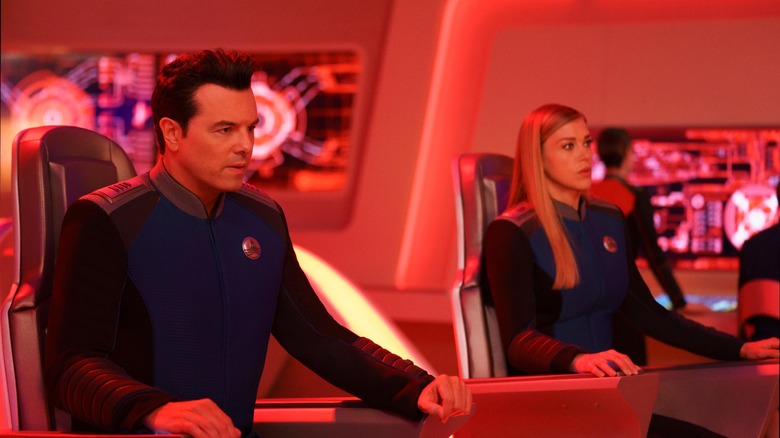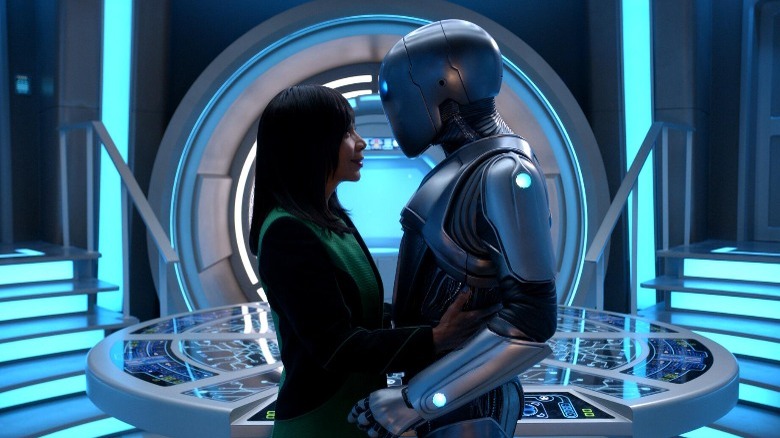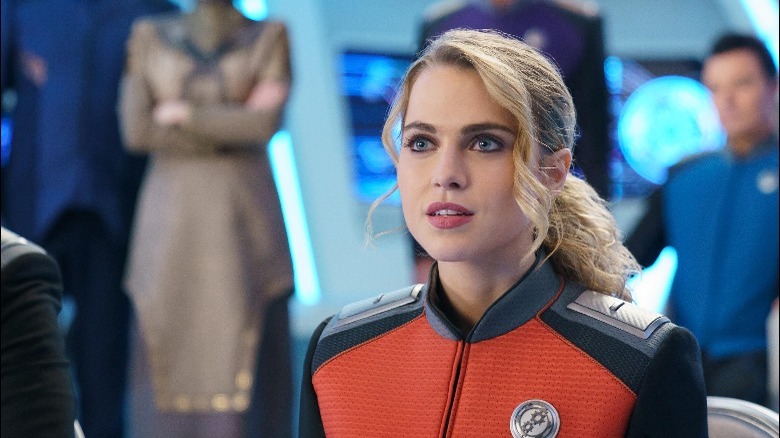Seth MacFarlane Isn't Afraid To Flip The Orville On Its Head
In 2017, Seth MacFarlane created the sci-fi comedy-drama, "The Orville," as a homage to the original "Star Trek" and its "Next Generation" successor. Despite its appreciation for "Stark Trek," "The Orville" never shies away from parodying the source material it is so inspired by, subverting space drama tropes in the process. Season 3 of the show, titled "The Orville: New Horizons," which premiered in June this year, continues the tradition of pushing narrative boundaries and expanding a rich world filled with possibilities.
The basic premise of "The Orville" follows series protagonist Ed Mercer (MacFarlane), the captain of the USS Orville, a space exploratory vessel in the 25th century. The show delves into the adventures of the ship's crew, which include thwarting a rebellion by genetically-advanced robots and standing up to the aggressive, xenophobic Krills. While the show has been well-received by critics, talks about a potential season 4 are still unfolding, which prompted MacFarlane to aptly title the season 3 finale "Future Unknown."
Although the future of "The Orville" is, in fact, unknown at this point, MacFarlane is not afraid to switch things up in potential future seasons if they happen to be greenlit. In an interview with SYFY WIRE, MacFarlane talked at length about the season 3 finale and how it sets up the possibility to turn the show on its head in the near future. Here's what MacFarlane had to say.
Also, there are spoilers ahead for season 3 of "The Orville."
Taking major risks to keep things interesting
The world of "The Orville" is vast, as the deep space vessel is often in contact with other alien races and the crew constantly find themselves dealing with the sociopolitical upheavals that unfold across the galaxy. Season 2 had developed the Kaylon storyline in great detail: these artificial lifeforms had reached a point in their technological advancement that convinced them that biological life forms were inferior due to their tendency to enslave others. The Kaylon rebellion was surprisingly thwarted by one of their own, Isaac (Mark Jackson), who has fallen in love with Orville crew member, Dr. Claire (Penny Johnson).
Season 3 showcases the aftermath of the failed rebellion, and what the Planetary Union decides to do to prevent the Kaylons from taking over. However, establish dynamics undergo massive changes — the Orville crew and the Planetary Union end up being allies with the Kaylons after the Krills and Moclans plan to annihilate the Kaylons with a destructive device. MacFarlane talks about this sudden upending of expected dynamics to keep the plot moving in an interesting direction:
"When we sat down to write Season 3, we didn't plan to upend all these alliances and that the Kaylon would now be our allies and the Maclons would now be our enemies. That just kind of came about through a willingness to not be afraid of f***ing with our own universe and not being too precious about maintaining cemented consistency in the way that you sometimes feel like you have to do with episodic television (that everything has to return to normal)."
Things do temporarily return to "normal" as season 3 ends with Isaac marrying Claire, but the path ahead is still strewn with potential twists and reveals. What could happen in season 4?
How The Orville's future seasons could pan out
Much like its previous seasons, the latest season of "The Orville" maintains its slapstick tone even during the direst situations. However, there's more to the show than just parodied tropes and space battle homages, as it aims to create authentic pathways for its characters and worldbuilding. As MacFarlane is not afraid to break the mold, season 4 could potentially flesh out unresolved plotlines in ways that are bold and refreshing.
For instance, the Orville's newest member, Lysella (Georgia Wingham), stands for the wonders of the utopian future and helps propel the show towards this unique vision, allowing the creators to further expand the lore of the show's galaxy. This creates ample space for season 4 to further flesh out the alien races that coexist in "The Orville," which can help provide viewers with a nuanced understanding of their diverse cultures and viewpoints. While other characters in the show, such as Gordon (Scott Grimes) are extremely in tune with the times, they share an affinity for the 21st century as opposed to the unknown future. Season 4 could steer its way towards untested waters through Lysella's character, and develop plotlines thereon.
In essence, MacFarlane's aim to "completely flip everything" does not stem from the need to induce shock value for the sake of it. The series creator emphasizes the importance of maintaining "the soul of what [the] show is" despite experimenting with its established canon. While all might not be well in a potential future season, the crew of the USS Orville will still have tons of adventures to experience and loads of new characters to meet. This is what makes "The Orville" worth rooting for.


